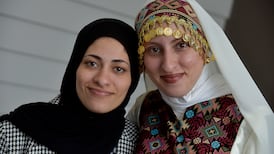New facility:Just over 400 prisoners (about 12 per cent of the prisoner population) are voting in this election, the first in which prisoners are being given access to the ballot box.
They are casting their votes over the weekend with the final tranche, the 39 registered electors in Mountjoy Prison, voting on Monday.
Peter, in his 40s and from north Dublin and serving life for murder, says he probably would not have voted at all were he not in prison. "I had no interest," he said when interviewed this week.
"The sad thing is it took seeing the notices up here, saying we could vote, to make me decide I may as well. I'm just wishing I hadn't been so ignorant over the years. Like it's made me watch the news and the politics and think about things, now I know I'm going to vote."
Just 14 of the 391 inmates have registered to vote in the prison - a low number which surprised the governor, Seán Lennon. "I did think there would be more. Interestingly of the 14, 13 had to be added to the electoral register for the first time. They may not have voted at all if they hadn't been here. I hope more will next time."
Though never specifically banned from voting here, prisoners had no access to the facility to vote. A spokeswoman explained new procedures had been put in place by the Prison Service following moves by the Department of the Environment to comply with a 2005 judgment from the European Court of Human Rights.
It ruled in favour of a British convicted murderer, John Hirst, and said denying prisoners the franchise "stripped a significant category of people of their convention right. . . in a way which was indiscriminate".
David, a man in his 50s from Westmeath and serving a life sentence for murder, agrees. "We're human beings like everyone else." Before being imprisoned 10 years ago he had been interested in politics. "I'm a Fianna Fáil man."
The prison with the highest turnout will be the Dóchas Centre (the women's prison) where 48 of the 94 inmates have registered. Some 60 of the 139 residents of Arbour Hill have registered; 64 of the 265 in Cork Prison, 75 of the 438 in the Midlands Prison and 39 of the 552 in Mountjoy will cast their votes.
Each prisoner will vote for the constituency they are from, by postal vote.
Governor Lennon proudly showed off the newly varnished ballot box which had been made in Wheatfield's workshop last week. "Each prisoner registered will be called to vote. They'll vote in secret, return the ballot paper to the nominated official here and he will return it to the returning officer in the relevant constituency."
While the prison publicised the right to vote among the prisoners, he says none of the parties sent election literature.
There has been little discussion about the election, says David. "People talk about sport, television, what's going on in their families' lives. There's not much interest in politics, especially among the lads who have a date for release. They're just aiming for that."
David says the act of voting "brings a bit of pride to yourself".
"It gives a sense of equality with the outside. Prisoners are so looked down on, but this is part of taking responsibility for yourself isn't it? There's no point giving out about politicians if you don't vote is there?"
Names of prisoners have been changed









